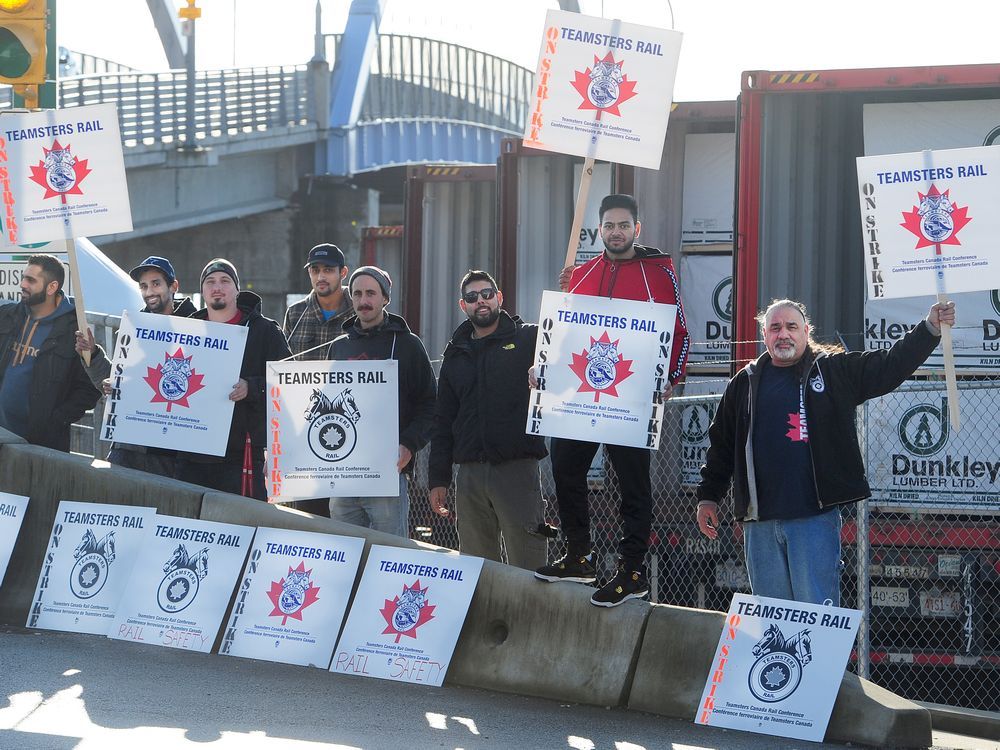CN strike puts trade roadblock up in Pacific Gateway

Credit to Author: Derrick Penner| Date: Wed, 20 Nov 2019 01:52:31 +0000
The impact of a strike at CN Rail began rippling through the Port of Vancouver even before the more than 3,000 conductors, trainpersons and yard workers set up picket lines Tuesday, said port CEO Robin Silvester.
“We’re seeing an impact as we speak,” Silvester said Tuesday after his annual address to the Greater Vancouver Board of Trade. That’s because CN began moving trains early to where they could be held safely during a labour disruption instead of handling port traffic.
Members of the Teamsters Rail Council walked off the job at midnight Tuesday as talks with CN hit an impasse over safety, rest times and limits on prescription drug benefits.
“To bring it back to the highest level, one dollar in three of Canada’s trade beyond North America moves through our gateway and that is going to stop moving in the next day or so,” Silvester said.
CN carries about half of that offshore trade, but Silvester added that CP Rail won’t be able to take over CN Rail shipments in and out of the port so congestion at container terminals will also affect truck movements of local cargo and stall commodity shipments from the Prairies to the coast.
“A couple of days stoppage takes a few weeks to recover from,” Silvester said.
The labour disruption comes at a bad time for B.C.’s resource sector, particularly the forest industry, which is enduring a crisis sparked by timber shortages and terrible markets, and northeast grain producers suffering poor weather.
“We send 90 per cent of what we make to markets around the globe, so having access to transportation infrastructure is critically important for our industry,” said Susan Yurkovich, CEO of the Council of Forest Industries.
And after a long summer and fall of mill closures and thousands of layoffs, “this added burden is going to have impacts on our operations, our workers and our communities if it doesn’t get resolved and resolved quickly.”
B.C. farmers are bit players in Canada’s massive grain sector, but for the 300 or so grain and oilseed growers in the province’s northeast, CN is their only export link after a fall when they were only able to harvest about half their crop, said Rick Kantz, president of the B.C. Grain Producers Association.
“It’s impacting (farmers) today,” Kantz said of growers who were ready to ship crops.
Some of the 3,000 striking Teamsters on a picket line at the CN yard in North Vancouver.
B.C. typically produces about 500,000 tonnes of grain a year, compared with Canada’s 21 million tonnes of grain exports, but Kantz said this province’s total will fall far short of a typical year.
Kantz said spring started favourably with enough rain to start off good crops. But the rain didn’t stop to allow grains to mature and farmers have only harvested roughly half of what they planted.
“So right away, we’re down to half a paycheque right now,” Kantz said. “And if we can’t move it into the system to be shipped, we’re not even getting that. That’s how critical it is.”
If the strike drags on, Kantz said the industry’s national organizations will press government to step in and take action.
Mining Association of Canada CEO Pierre Gratton, on Tuesday, recommended government impose binding arbitration and consider it a required step to prevent future disruptions of the country’s Class 1 railways to prevent damage to the economy.
Gratton, in a statement, said that restrictions on rail traffic “will trigger the closure of mines with concurrent layoffs of thousands of employees beginning in a matter of days.”
The Financial Post reported that while talks continue in Montreal, workers walked out despite the last-minute push by Labour Minister Patty Hajdu and Transportation Minister Marc Garneau to secure a deal. The ministers met with Teamsters and CN representatives on Monday.
Hajdu urged the parties to continue negotiations. “While we are concerned about the impact of a work stoppage on Canadians, we remain hopeful they will reach an agreement,” she said in a statement.
Teamsters Rail Council president Lyndon Isaak said the union wants CN to stop the practice of requiring workers to operate trains remotely while hanging on to moving locomotives with one hand and holding a remote in the other, which it argues is unsafe.
The union is also balking at a lifetime cap on prescription drug coverage and said the company is making it more difficult to take time off and work longer hours.
“Fatigue has been recognized by the Transportation Safety Board as a major safety problem in this industry. Too many railroaders are operating trains when they should be resting,” Isaak said in a statement.
In the meantime Silvester said the strike is another disruption that will affect the reputation of Canada’s Western ports.
Silvester left the board of trade event for a business trip to Taipei, Singapore and Korea where “I know I’m going to spend most of my time talking to customers about this disruption.”
“I hope by the time I get there, I’ve got better news to tell them.”
With files from Bloomberg